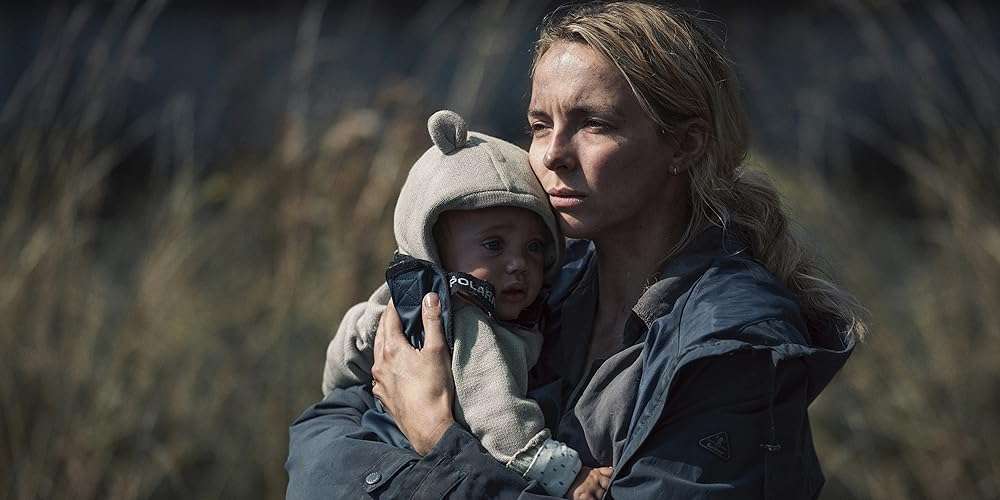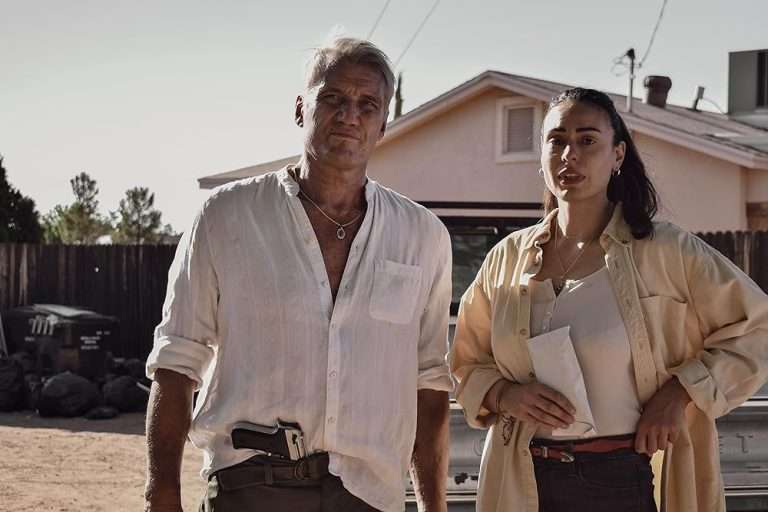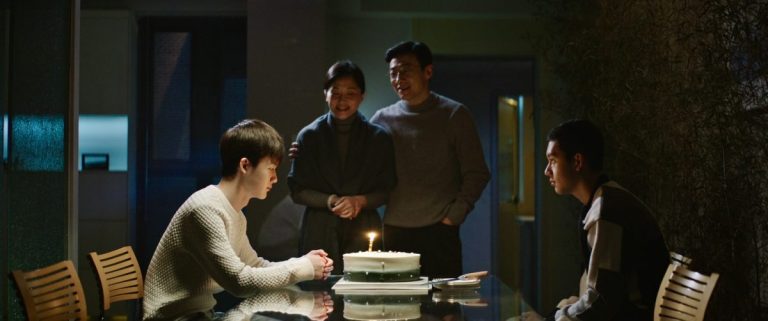“The End We Start From” is a type of film that, in the wrong hands, could have panned out very differently. However, this first feature from director Mahlia Belo shines, not trapped by the conventions of the survival dramas it takes cues from. It takes the central premise and uses it as a springboard to examine the deeply intimate experience of motherhood. Aided by a spectacular lead performance, the familiar beats of both these genres – a drama about a new mother contending with the trials and tribulations of early parenting and an ecological thriller with a simple goal of survival at all costs – collide together hauntingly, merging to create something uniquely distinct.
Based on Megan Hunter’s novel of the same name, the film depicts an ominous storm. A disaster that causes severe flooding across England and the scale of displacement leading to anarchy. Jody Comer portrays our unnamed protagonist, and whilst her lack of characterization should be a pivotal issue, her stripped-back persona places the emphasis squarely on her relationship with her child. This serves as a thought-provoking study of who a person becomes when they give birth and how their identity shifts to focus on their new child’s survival. Whilst there is a lack of obvious development for the lead, we subtly grow to align with her.
Universal ideas are painted carefully onto this blank canvas of a character and, as a spectator, we construct our own backstory for her with the trinkets of memory we are afforded to help in this creation. It is superb implicit character-building and a testament to the power of “show, don’t tell.” However, it should be noted that this kind of trick would not work without such an exceptional, softly charismatic performance from Comer, having to carry the whole film on her shoulders. The film is starkly emotive in that when she is positive, we feel that sense of optimism, and when she is negative, this pessimism seeps into our subconscious.
As she goes into labor, the flooding begins, indicating that this ecological disaster can and should be read as an extended metaphor. Her world is disrupted both physically and internally, allowing for cliches of survival dramas, such as familial support, the power of friendship, and the want for an end, to be recontextualized through the lens of motherhood. Suddenly these familiar beats transform into something more profound. Combined with the aforementioned allegiance we feel towards the protagonist, there are real stakes to her journey.

Belo’s direction and the screenplay from Alice Birch (“Lady Macbeth,” “The Wonder”) excel in drawing the right emotions from the spectator, yet none of it ever leans into spectacle or melodrama. Instead, the actual disaster itself is almost an afterthought, given the protagonist’s pregnancy. It doesn’t arrive as a bombastic occasion but a small problem that slowly grows into something far bigger, the reality of the situation slowly dawning and creeping into the psychologies of both the characters and spectator in unison. The threat is so believably developed. Experiencing such a seismic societal shift through a deeply subjective experience means we get only a small glimpse into the wider world. Like the protagonist, we must be constantly adapting and keeping up with the escalating threat of the scenario.
Where the film does run into problems is with the floaty structure of the piece. Unfortunately, “The End We Start From” is paced inconsistently, giving the film an uneven feel. Now, this may make sense on a figurative level to reinforce the inherent instability of the protagonist’s situation, but some narrative beats are just far more compelling than others. Moments where she finds herself interacting with a colourful ensemble are handled well, but it’s often the quieter, more intimate moments that don’t quite land.
Belo lacks confidence in letting moments breathe, and the repeated cutaways to Comer seeing visions of Joel Fry, who skillfully portrays the father of the newborn, feel forced and do little to develop either party. It is a shame because the relationship is established well enough in the opening act. When his character exits the narrative, the gaping hole this has left in the mother’s life is still felt; perhaps Belo didn’t trust the audience to develop a connection with this core relationship so early. But since you do, it feels out of place.
The cinematography by Suzie Lavelle is excellent, balancing both this feeling of expansiveness through wide shots and claustrophobia through close-ups, whilst the ragged production design perfectly complements the film’s attempted verisimilitude. The film has a novel quality to it which I think will be appreciated by most. It may, at times, come across as a very obvious first-time feature. The ending is oversentimental, and sometimes it does fall into wafty philosophizing, yet it stays charming throughout. But Comer is stunning, and the film’s depiction of the disaster itself is brilliant in its execution. Not flawless, but a film that I would recommend putting on your radar for a solid experience.



![I Am Heath Ledger [2017]: A Touching Portrait of a Fallen Artist](https://79468c92.delivery.rocketcdn.me/wp-content/uploads/2017/05/i-am-heath-ledger-01-1-768x418.png)
![The Fabulous Filipino Brothers [2021] Review – A Personal Comedy That Fails To Hit The Right Spots](https://79468c92.delivery.rocketcdn.me/wp-content/uploads/2022/02/The-Fabulous-Filipino-Brothers-2021-768x432.jpg)

![Asakusa Kid [2021] Review – Takeshi Kitano biopic works more as sum of individual parts](https://79468c92.delivery.rocketcdn.me/wp-content/uploads/2021/12/Asakusa-Kid-2-768x432.jpg)

